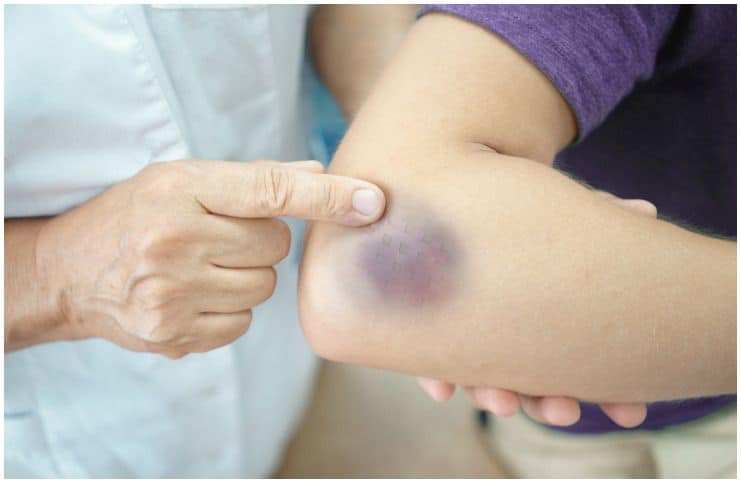Ecchymosis (bruising) occurs when small blood vessels under the skin break. This causes bleeding within skin tissues. Eventually, the body reabsorbs the blood, and the mark disappears.
Easy bruising can happen when the capillaries are weakened by medications (like – prednisone, aspirin, and prednisolone), diseases (like – scurvy, a condition caused by a prolonged deficiency of vitamin C), and aging.
Here is a list of 10 essential oils for bruising:
#1 Helichrysum
This essential oil is a cicatrizant and has antimicrobial, antiallergenic, antitussive, anti-inflammatory, fungicidal, and antiseptic properties. It reduces the fever as well as it helps to cure the root of high temperature. Moreover, helichrysum oil can block UV-light damage that can contribute to the formation of skin cancer, reduce signs of aging on the skin, and heal bruising faster.
There are no known adverse effects of using this essential oil, however, contact with sensitive areas like the inner ears and eyes is not recommended since it can cause skin irritation.
#2 Lavender
Lavender is a fantastic oil that fights hair loss, anxiety, insomnia, and stress. It is also useful in faster ecchymosis healing as well as it aids in treating burn scars. For this, drop lavender essential oil on cuts to kill bacteria, stop bleeding, and clean wounds or on ecchymosis sites.
In addition, you can use lavender essential oil to the back of the neck and your temples to help melt away feelings of tension or stress and enjoy its relaxing aroma.
#3 Tea Tree
It is produced from the leaves of the Melaleuca alternifolia, a plant native to Australia. It has excellent antibacterial, antiviral, and antifungal properties which fight against the bacteria, virus, or fungus causing respiratory infections, skin problems, or sinus infection.
Note – it can be irritating to the mucous membranes of the throat and nose, and skin, therefore, use only diluted with a carrier oil.
#4 Rosemary
This herb was considered sacred by the Hebrews, Egyptians, Romans, and Greeks, and was used in the Middle Ages to protect against evil spirits and the plague.
Rosemary essential oil has potent antiseptic and antimicrobial properties which make it efficient in efforts to eliminate dermatitis, eczema, oily skin, ecchymosis, and acne.
Note – avoid it if you have epilepsy as its high camphor content can cause seizures. In addition, do not use this essential oil during pregnancy or if you are breastfeeding a baby.
#5 Geranium
It is extracted through steam distillation of leaves and stems of the Geranium plant, bearing the botanical name Pelargonium odorantissimum. This oil acts as a tonic for the paired adrenal glands which sit atop the kidneys.
Furthermore, it has been used for millennia for its antiseptic properties which can help speed up the healing of wounds and bruising. Additionally, it supports the treating of a variety of skin conditions, like – frostbite, burns, athlete’s foot, ecchymosis, and fungal infections.
#6 Frankincense
This oil has strong antiseptic properties which help speed up the healing of scrapes, burns, and cuts. Also, it is used by either absorbing it through the skin or inhaling the oil, usually mixed with a carrier oil, like jojoba oil or an unscented lotion.
To use it, simply apply a diluted solution of this essential oil on wounds, and your wounds will be protected from infections and heal faster.
#7 Lemongrass
It is extracted from the leaves of the lemongrass plant, a perennial fast-growing aromatic grass, that originally was growing wild in India.
It may prevent the growth of some yeast and bacteria due to its antioxidant properties. Also, this oil is a great oil to use to support the thyroid as well as in inhibiting bacterial infections in the stomach, large intestine, urinary tracts, respiratory system, wounds, and other organ systems.
Moreover, it is known for its capacity to repel insects, like – ants and mosquitoes, because of its high geraniol and citral content.
#8 Cypress
It is made from the needle-bearing tree of deciduous and coniferous regions — its botanical name is Cupressus sempervirens. The antiseptic qualities of this essential oil make it an excellent choice to use both internally and externally.
Tip – use it as a massage oil to relieve arthritis, asthma, cramps, rheumatism, heavy menstrual flow, and varicose veins.
#9 Aloe Vera
Because this oil contains the health properties of the aloe vera plant, it possesses potent antibacterial, anti-inflammatory, antifungal, antiviral, astringent, and antioxidant properties.
More importantly, similarly, with aloe vera gel, this essential oil is known for its capacity to promote skin health. Also, it helps the skin heal from sunburn faster because of its antioxidant abilities.
#10 Arnica
It is made from the blossoms of a perennial flowering plant called arnica, which belongs to the daisy family.
Topical application of this oil was more beneficial at reducing bruises than low-concentration vitamin K creams, according to a study done at the Northwestern University’s Department of Dermatology.
Lastly, numerous professional athletes even use it as first aid relief for exercise- or sports-related injury or pain.
Images source – Shutterstock
READ MORE: Facts About Leukemia
